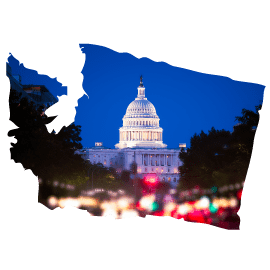Licensure Deficiencies: Washington
Special Education Teacher Preparation Policy
Analysis of Washington's policies
Unfortunately, Washington offers a K-12 special education certification and an early childhood special education certification. Although special education candidates are required to earn an additional endorsement, there is no requirement the dual endorsement must be in elementary education, or middle or secondary core content areas. The dual endorsement could include library media, health fitness, or computer science. The dual endorsement does not limit the grade level at which a special education teacher can teach.
Recommendations for Washington
End licensure practices that fail to distinguish between the skills and knowledge needed to teach elementary grades and secondary grades.
The broad K-12 umbrella is deeply problematic for the overwhelming majority of high-incidence special education students, who are expected to learn grade-level content. Washington should strengthen its dual endorsement requirement and require the endorsement be earned at either the elementary level or the secondary level in a core content area, and only allow teachers to teach students in the applicable grade level.
State response to our analysis
Washington was helpful in providing NCTQ with facts that enhanced this analysis.
Updated: December 2017
Select another topic
General Teacher Preparation
- Program Entry
- Teacher Shortages and Surpluses
- Program Performance Measures
- Program Reporting Requirements
- Student Teaching/Clinical Practice
- Teaching Methods
Elementary Teacher Preparation
Secondary Teacher Preparation
- Middle School Content Knowledge
- Middle School Licensure Deficiencies
- Adolescent Literacy
- Secondary Content Knowledge
- Secondary Licensure Deficiencies
Special Education Teacher Preparation
Alternate Routes
Hiring
- Requirements for Out-of-State Teachers
- Provisional and Emergency Licensure
- Licensure for Substitute Teachers
- Supporting New Teachers
Teacher and Principal Evaluation
Teacher Compensation
Retaining Effective Teachers
Early Childhood Preparation
How we graded
4C: Special Education Licensure Deficiencies
- Specific Licensure: The state should require its teacher preparation programs to sufficiently distinguish between the differing needs of elementary special education teachers and secondary special education teachers by requiring distinct elementary and secondary special education licenses.
The total goal score is earned based on the following:
- Full credit: The state is only eligible for the full point if it requires teacher preparation programs to sufficiently distinguish between the differing needs of elementary special education teachers and those of secondary special education teachers by requiring distinct elementary and secondary special education licenses. The state is not eligible for any credit if it offers K-12 special education licenses either in isolation or as an alternative to grade-specific licenses.
- One-quarter credit: The state is eligible for one quarter of a point if, in addition to K-12 special education licenses, the state offers both elementary and secondary licenses.
Research rationale
Generic K-12 special education licenses are inappropriate for teachers of high-incidence special education students.
Too many states make no distinction between elementary and secondary special education teachers, certifying all such teachers under a generic K-12 special education license. While this broad umbrella may be appropriate for teachers of low-incidence special education students, such as those with severe cognitive disabilities, it is deeply problematic for high-incidence special education students, who are expected to learn grade-level content.[1] And because the overwhelming majority of special education students are in the high-incidence category, the result is a fundamentally broken system.
It is virtually impossible and certainly impractical for states to ensure that a K-12 teacher knows all the subject matter he or she is expected to teach. Further, the issue is just as valid in terms of pedagogical knowledge. Teacher preparation and licensure for special education teachers must distinguish between elementary and secondary levels, as they do for general education.[2] The current model does little to protect some of our most vulnerable students.
[1] Levenson, N. (2011). Something has got to change: Rethinking special education (Working Paper 2011-01). American Enterprise Institute for Public Policy Research. Retrieved from http://eric.ed.gov/?id=ED521782
[2] Feng, L., & Sass, T. R. (2010). What makes special education teachers special? Teacher training and achievement of students with disabilities (Working Paper 49). National Center for Analysis of Longitudinal Data in Education Research. Retrieved from http://www.urban.org/UploadedPDF/1001435-what-makes-special.pdf; Levenson, N. (2011). Something has got to change: Rethinking special education (Working Paper 2011-01). American Enterprise Institute for Public Policy Research. Retrieved from http://eric.ed.gov/?id=ED521782

